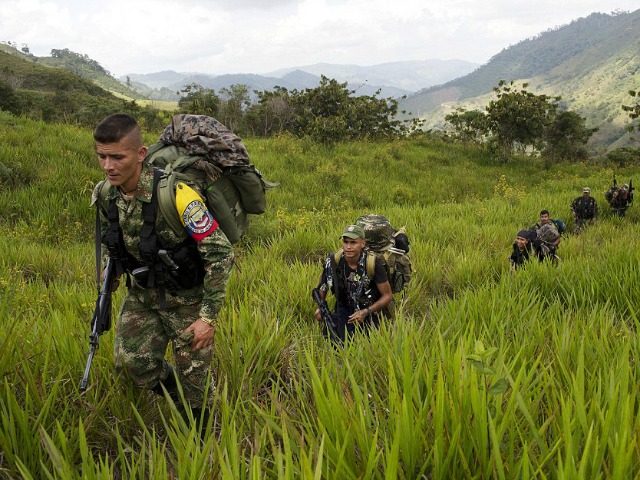After failing to do so on multiple occasions since President Juan Manuel Santos announced victory in September 2015, the government of Colombia has finally completed an agreement with the FARC to reintegrate the terrorist group into society, even allowing them representatives in the nation’s Congress.
In a speech announcing the finalized deal this week, Santos described it as “the beginning of the end to the suffering, pain and tragedy of war.” The deal would allow for the return of the heads of the Revolutionary Armed Forces of Colombia, a half-century-old Marxist terror group, to civil society, and envisions its evolution into an influential political party.
Many of the provisions the government has agreed to are alarming many Colombians who fear the move will empower the FARC further after combined Colombian/CIA counterterrorism operations decimated the group during the term of President (and now Senator) Álvaro Uribe in the 2000s. Most prominent among these is the provision that gives the FARC ten representatives in Congress for the 2018 and 2022 election cycles. These places are guaranteed whether FARC-friendly candidates win local elections or not, but they do not come with a vote in either chamber of Congress. Rather, the representatives have the ability to speak on the House and Senate floor and lobby for the FARC.
Following those cycles, FARC terrorists who have served their sentences for crimes will be eligible to run for office.
Some of the details in the new deal, posted in full by the Colombian newspaper El Tiempo, are not new — the FARC leaders currently hiding in Cuba will be allowed to return but will be processed by a special tribunal, as will all members. FARC members have 180 days to hand over the weapons and turn themselves to police before they are processed. During that time, they will be living in “temporary transition zones,” located far from urban centers.
The special tribunal will find whether they are guilty of “political crime” or “crimes against humanity.” Those found guilty of political crimes will not have to serve prison time in many cases, instead forced to help dig up FARC landmines or other such community service. Individuals found guilty of the higher category of crime will have to serve prison time. Authorities have not been clear on what sorts of crimes will be identified as “political crime,” a significant detail given that much of the FARC’s activity defies a division between the two categories.
The FARC have killed 220,000 people, according to the Washington Post, and displaced seven million refugees. In addition to terrorist activities like bombings and attacks meant to destabilize the Colombian government and replace it with a Marxist terror state, the FARC is one of the most profitable cocaine-trafficking entities in the world. The FARC is the wealthiest non-jihadist terror group in the world; including jihadist groups, it is outmatched only by Hamas and the Islamic State.
FARC also routinely practices kidnapping — both the kidnapping of middle- and upper-class individuals for ransom and of lower-class children to serve as child soldiers — and has been implicated in hundreds of forced abortions on female child soldiers and captives.
An estimated 7,000 FARC soldiers remain, many former child soldiers who have never lived a civilian life. While they await their special tribunal verdicts, the government will be responsible for reintegrating them into society through training in the transition zones. No civilians are to be allowed in those zones for safety purposes.
FARC members have repeatedly referred to the deal as a victory. “We have finished fighting with weapons and will now do battle with ideas,” Iván Márquez, the FARC leader in charge of negotiations in Havana, said this week. In June, when the government announced new talks leading up to this latest deal, FARC terrorists told the Miami Herald the negotiations signified a victory for the group: “The reality is that the [government] was never able to defeat us and that’s why this process isn’t about us capitulating.”
For the agreement to pass, however, the Colombian people must approve it. A referendum vote is set for October 2, in which 13 percent of the voting eligible population must participate for it to count. The FARC have resisted a referendum vote for months, arguing it is not necessary. Uribe and his faction in the Senate oppose the deal, issuing multiple statements on Wednesday condemning the integration of a terrorist organization into the legislature. It is expected that they will continue rallying the opposition into October; previously, Uribe’s faction has brought hundreds of thousands of Colombians out to protest the peace deal across the country.

COMMENTS
Please let us know if you're having issues with commenting.